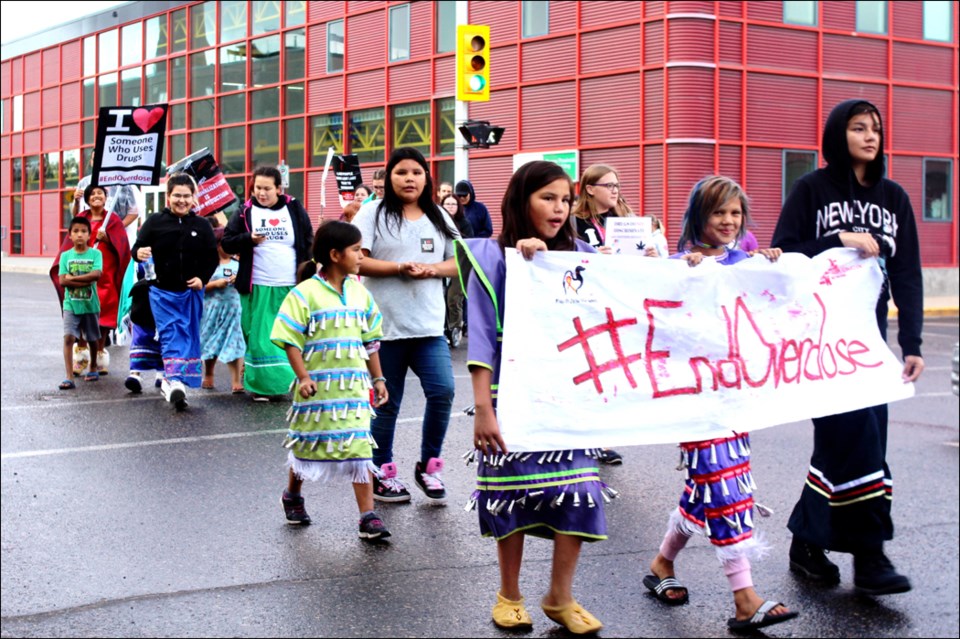Marchers headed down Main Street August 29 with one goal in mind – saving lives.
Around 50 people took part in a march for International Overdose Awareness Day, observed worldwide August 31.
The march was organized by Play it Safer Network. Organizer Tieryn Steele said the idea for a memorial march started because Flin Flon had never had anything like this before.
“This is the first year that we're doing province-wide events everywhere for International Overdose Awareness Day,” Steele said after the march.
“Some of the other networks are just doing training, some are having lunch and learns. The network decided that we would do a memorial march and a candlelight vigil because Flin Flon had never done anything before. I think lots of people need this to remember those they've lost.”
After the march concluded, a brief ceremony was held, led by a prayer and smudge conducted by Flin Flon Friendship Centre elder Margaret Head-Steppan.
The march also attracted a special guest. Federal Conservative candidate Cyara Bird was in Flin Flon visiting the area preparing for the upcoming election and joined the march after driving by and seeing the marchers’ regalia.
Federal Conservative leader Andrew Scheer has come under criticism for not supporting harm reduction efforts like safe injection sites.
Bird said she would like to see a focus on mental health support to help fight addictions, pointing to her own history and a high success rate in traditional-based Indigenous sobriety camps.
“I was an alcoholic back in 2015,” she said.
“The reason why I had that kind of lifestyle choice was because I had some untreated mental health issues such as depression and anxiety and I found alcohol the easier way to cope with it than admitting I had a problem and going to rehab. If I would have had the option to go to one of the traditional healing camps to get sober, I totally would have taken the opportunity because there's no there's no stigma behind it.”
Bird said she wanted government efforts to be focused on getting people sober, but acknowledged the role something like safe consumption sites can play in harm reduction.
“I think it's good that they have safe places to do that,” she said.
“So if something does happen, then they're able to get the help. But I would really like to see the focus on getting people sober because it’s better in the long run to help people get sober.”
Steele hopes Bird’s attendance means support for harm reduction efforts is spreading.
“I'd like to see more money go towards harm reduction and harm reduction programs like safe consumption sites would be an amazing thing to have,” she said.
“These are all things communities everywhere in Canada really, really need. We are slowly getting them. Not in Flin Flon, but in other, bigger cities - they have safe consumption sites, and they really do work. It was really exciting to see [Bird] come out. It's amazing to have that kind of support, especially from the Conservatives.”
Signs in the march even advocated for decriminalizing all drugs, similar to how Portugal has dealt with addictions. The European country decriminalized drug possession in 2001.
The Institute of Labour Economics, published a paper in 2017 showing the impacts of that policy
“The results suggest that a policy change implemented in Portugal contributed to a decrease in the number of heroin and cocaine seizures, a decrease in the number of offenses and drug-related deaths, and a decrease in the number of clients entering treatment,” the introduction of the paper reads.
“Moreover, the policy change contributed to a reduction in the incidence of drug addicts among HIV individuals.”
Federal NDP party leader Jagmeet Singh said during his leadership bid that Canada should follow Portugal’s model, but no other major party supports that position.
Advocating for policy change is part of the long term goal of the march, but Steele said the walk had other, more pressing goals.
“We’re really just marching to bring awareness to overdose - that was the main goal,” she said.
“Awareness, then what comes with awareness is hopefully policy change.”
Attendees at the march wore buttons, shirts, and gave out stickers that said ‘I love someone who uses drugs,’ and Steele said that was the message she hoped the march put forward.
“I think it's important that as a community, we change our opinion of drug use - that's why we're all wearing these,” she said, gesturing to her shirt.
“It’s challenging the opinion that people are so far removed from drug use. If you really think long and hard about it, we all love somebody who uses drugs, whether they're legal or illegal drugs. We really do all of somebody who uses drugs and I think it's important that the whole community recognizes that.”
After the march, the Play it Safer Network had a drug overdose training for the public. Steele said she hopes to hold another event soon with a greater focus on training people to recognize and properly respond to an overdose.




